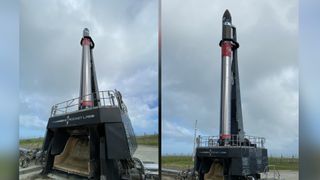Rocket Lab delays Electron booster launch and recovery test to Monday
Liftoff is now scheduled for no earlier than Monday, May 2.

Rocket Lab has postponed the launch of an Electron booster it hopes to snatch out of the sky with a helicopter after liftoff to no earlier than Monday (May 2) due to weather.
Unfavorable weather conditions are the primary reason for the launch delay, Rocket Lab officials said in an update, but the company is taking the time to make final checks on its recovery system for the Electron rocket reusability test.
"After a busy week of capture testing, and while we wait for weather to improve, we're taking an additional day for final helicopter and recovery system optimization ahead of our first mid-air capture attempt," Rocket Lab representatives wrote in the Twitter update. Liftoff is now targeted for Monday during a nearly 2-hour window that opens at 6:35 p.m. EDT (2235 GMT).
Rocket Lab's upcoming launch, called "There And Back Again," will mark the company's first attempt to recover an Electron booster's first stage in flight as part of a plan to reuse the rockets and lower launch costs.
The plan calls for the Electron booster's first stage to launch as normal, then fall back to Earth while optimizing its descent with "series of complex maneuvers designed to enable it to survive the extreme heat and forces of atmospheric reentry," the company said in a mission description. A heat shield will protect the rocket's nine Rutherford engines while a parachute will slow its fall so it can be captured by a Sikorsky S-92 helicopter.
Rocket Lab has recovered Electron boosters from the ocean before and practiced mid-air catches of dummy rockets, but has not yet attempted to catch an Electron returning from space after an actual launch.
"Unlike previous recovery missions, 'There And Back Again' is attempting to avoid an ocean splashdown as the helicopter will return to the stage back to land after catch," Rocket Lab wrote in the description. "Upon success of this recovery, Electron will be one step closer to being the first reusable orbital small sat launcher."
Get the Space.com Newsletter
Breaking space news, the latest updates on rocket launches, skywatching events and more!
Despite its ambitious nature, the Electron recovery test is not the primary goal for the There And Back Again mission.
Rocket Lab will launch 34 satellites into orbit on the flight for a variety of customers, including three demonstration satellites for startup E-Space, two batches of picosatellites for an "Internet of Things constellation" on a flight arranged by Spaceflight, Inc., and the AuroraSat-1, a demonstration satellite to test space junk removal technologies built by the Finland-based company Aurora Propulsion Technologies.
Email Tariq Malik at tmalik@space.com or follow him @tariqjmalik. Follow us @Spacedotcom, Facebook and Instagram.
Join our Space Forums to keep talking space on the latest missions, night sky and more! And if you have a news tip, correction or comment, let us know at: community@space.com.

Tariq is the Editor-in-Chief of Space.com and joined the team in 2001, first as an intern and staff writer, and later as an editor. He covers human spaceflight, exploration and space science, as well as skywatching and entertainment. He became Space.com's Managing Editor in 2009 and Editor-in-Chief in 2019. Before joining Space.com, Tariq was a staff reporter for The Los Angeles Times covering education and city beats in La Habra, Fullerton and Huntington Beach. In October 2022, Tariq received the Harry Kolcum Award for excellence in space reporting from the National Space Club Florida Committee. He is also an Eagle Scout (yes, he has the Space Exploration merit badge) and went to Space Camp four times as a kid and a fifth time as an adult. He has journalism degrees from the University of Southern California and New York University. You can find Tariq at Space.com and as the co-host to the This Week In Space podcast with space historian Rod Pyle on the TWiT network. To see his latest project, you can follow Tariq on Twitter @tariqjmalik.
